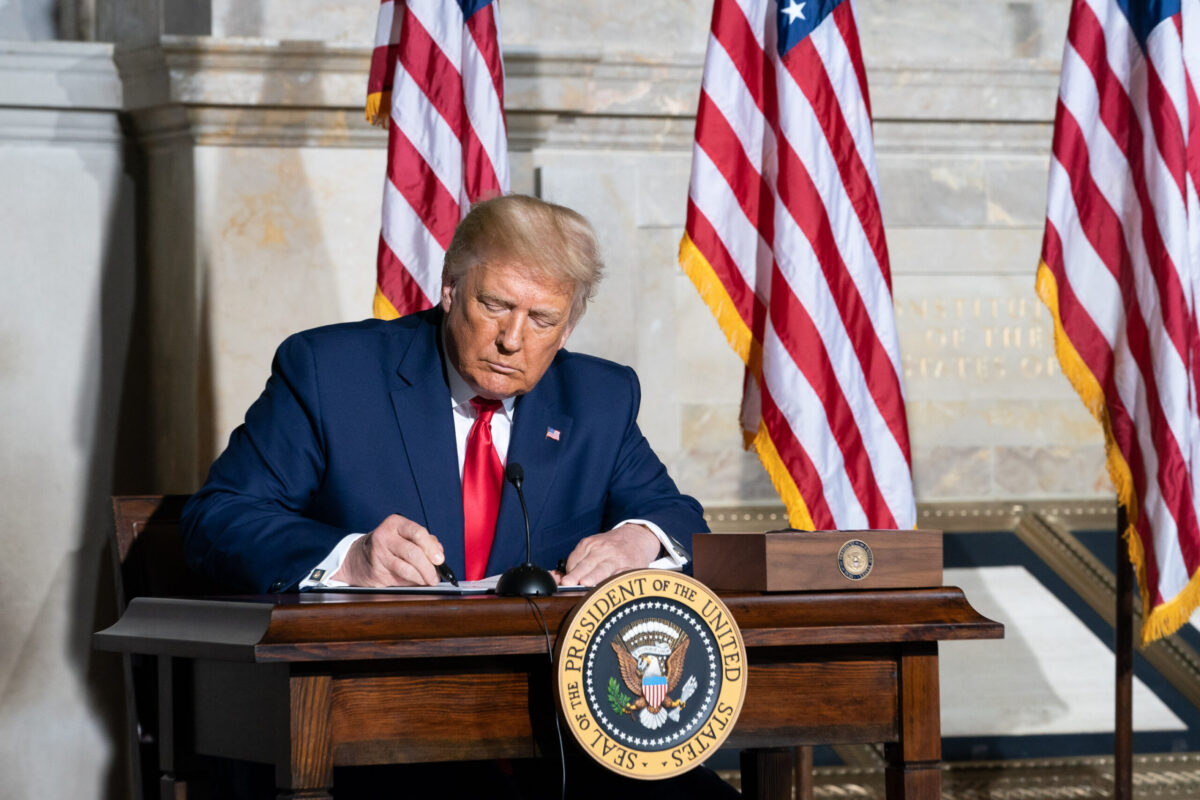Investigating Trump’s Supreme Court Short List
Here's a summary of the records we've requested related to some of the names on Trump's list of potential Supreme Court picks.

Following Friday night’s earth-shaking news of the passing of Supreme Court Justice Ruth Bader Ginsburg — just six and a half weeks before Election Day — lists of President Donald Trump’s potential picks to replace Ginsburg began recirculating.
Opposition to Trump filling the seat at all so close to the election remains strong. Everyone remembers that Senate Majority Leader Mitch McConnell refused to hold hearings on the nomination of Judge Merrick Garland in 2016, President Barack Obama’s nominee to the high court, nearly eight months before that year’s election. Surprising few with his hypocrisy, McConnell has indicated he will go forward with a nomination anyway. But voters are reminding other senators like Lisa Murkowski, Susan Collins, Lindsey Graham, and Mitt Romney of their previous promises and stated principles.
The president’s list of potential nominees is populated not only with far-right, Trump-appointed judges, but also with conservative politicians. American Oversight has already filed a number of Freedom of Information Act requests to shed light on the influences and connections of these figures, as well as their past communications. Below is a summary of the records we’ve requested, as well as those we intend to file in the coming days. Be sure to check for updates on our Supreme Court investigation page over the next week.
Amy Coney Barrett
High on many lists of possible names is Barrett, who is currently a judge on the U.S. Court of Appeals for the 7th Circuit, having been nominated for that seat by Trump. Barrett, a devout Catholic, has criticized Roe v. Wade as well Chief Justice John Roberts’ decision upholding the Affordable Care Act.
American Oversight is currently drafting public records requests to uncover more information about her 2017 circuit court nomination. Stay tuned.
Amul Thapar
Thapar had also been discussed as a possible nominee before, and was interviewed by Trump in 2017 before Neil Gorsuch was ultimately selected. Trump nominated him to the U.S. Court of Appeals for the 6th Circuit in 2017. Thapar is a close ally of McConnell, having served as the U.S. attorney as well as a district judge for the Eastern District of Kentucky.
American Oversight has filed FOIA requests with the Justice Department’s Executive Office for United States Attorneys for communications from his time as a U.S. attorney and assistant U.S. attorney, including for records that could shed light on his work for the Attorney General’s Advisory Committee.
Noel Francisco
Francisco stepped down as solicitor general in July after helping to defend Trump’s travel ban and a host of other controversial measures, such as the administration’s attempt to end Deferred Action for Childhood Arrivals and to add a citizenship question to the 2020 census.
Early in the administration, American Oversight filed a FOIA request and lawsuit for Francisco’s ethics waivers and recusal records related to defending the travel ban, as his former law firm had filed an amicus brief on the case — you can read more about what we found in that investigation here. And in response to another request we filed, the Justice Department said that it was withholding records related to communications between the solicitor general’s office and the White House about a number of politically sensitive issues.
Sen. Tom Cotton
Trump’s list of potential nominees that was unveiled last week included someone that hadn’t been there before: the Arkansas senator. Shortly after Trump announced that list, Cotton tweeted, “It’s time for Roe v. Wade to go.” Cotton has also been a vocal proponent of the authoritarian federal and military policing of racial justice protests.
American Oversight has filed requests for Cotton’s communications with U.S. Attorney John Bash, who was tapped by Attorney General William Barr to investigate the intelligence community’s “unmasking” practices, as well as for his communications with Securities and Exchange Commission officials regarding the regulation of risky leveraged loans. Our lawsuit against the State Department and the CIA for records related to Secretary Mike Pompeo’s outside political influences also seeks Pompeo’s communications with Cotton, who has reportedly been called upon by McConnell in the past to urge Pompeo to run for Senate.
Sens. Ted Cruz and Josh Hawley
Cruz was another candidate on Trump’s recent list who raised some eyebrows. The Texas senator has since indicated he’s not interested in joining the Court — he’s also included in our request for U.S. Attorney Bash’s communications.
Missouri’s Hawley has also said he isn’t interested, but like the other senators, his inclusion coupled with his outspoken belief that Roe v. Wade was “wrongly decided” was an indication of the overtly political shape of Trump’s new list. Hawley is included in our FOIA request to the Defense Department for communications about the January 2020 Iranian missile attack that resulted in traumatic brain injuries for U.S. troops. Along with the Union of Concerned Scientists, we’re also seeking communications between his staff and the Department of Agriculture regarding the questionable decision to relocate key components to Kansas City, Mo.
Daniel Cameron
Cameron is currently serving as Kentucky’s attorney general, and is another figure with close ties to the Senate majority leader, having previously served as McConnell’s legal counsel. We’ve filed a request for his communications with McConnell’s office, and we’re also looking into his communications about Kentucky’s Ballot Integrity Task Force or with other state attorneys general.
Joan Larsen
Larsen, who was a law clerk to the late Justice Antonin Scalia, was nominated by Trump in 2017 to the U.S. Court of Appeals for the 6th Circuit. During the George W. Bush administration, she had served as deputy attorney general in the Justice Department’s Office of Legal Counsel — we filed FOIA requests for all legal advice and formal opinions she signed and talking points she prepared, as well as her calendars and email communications.